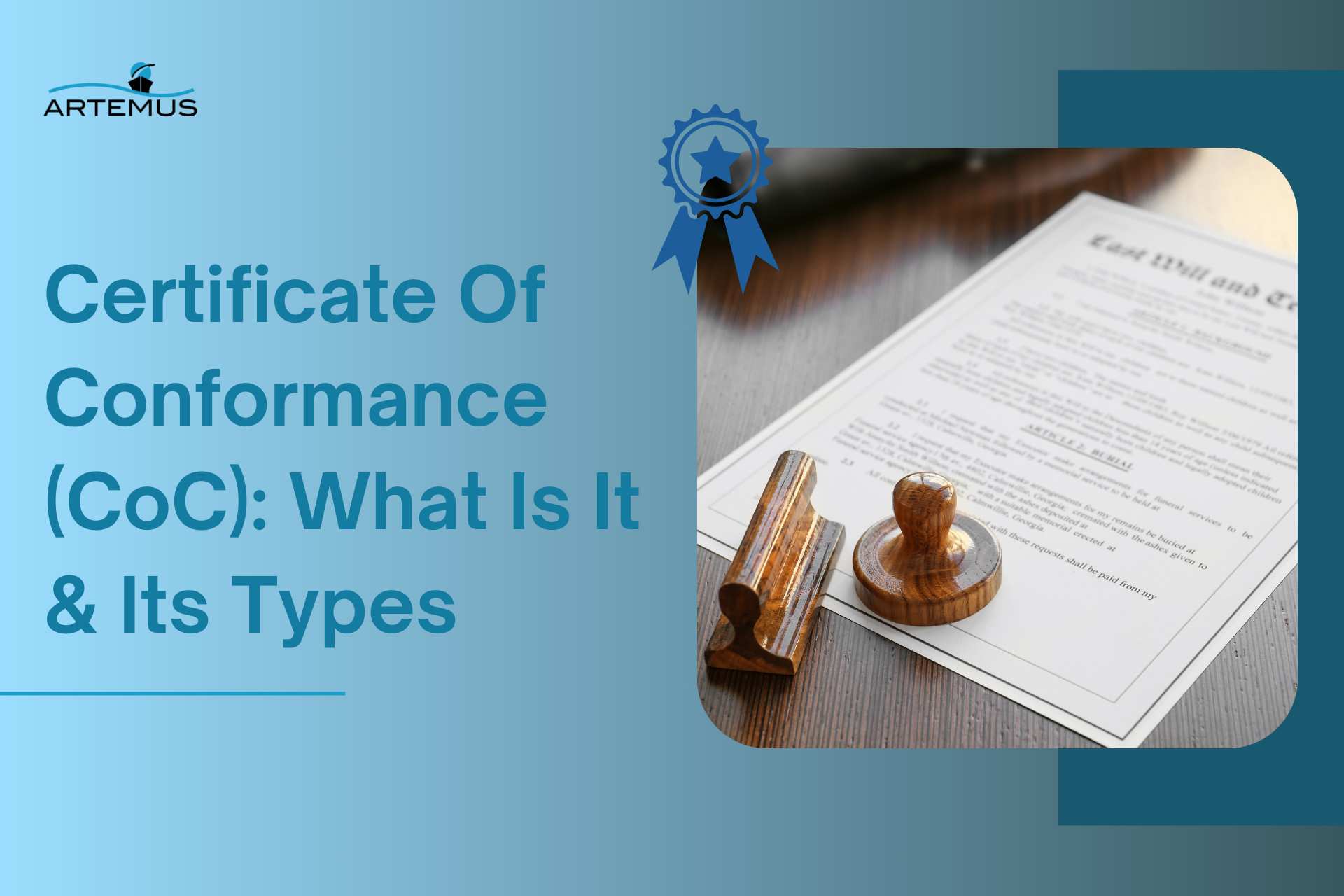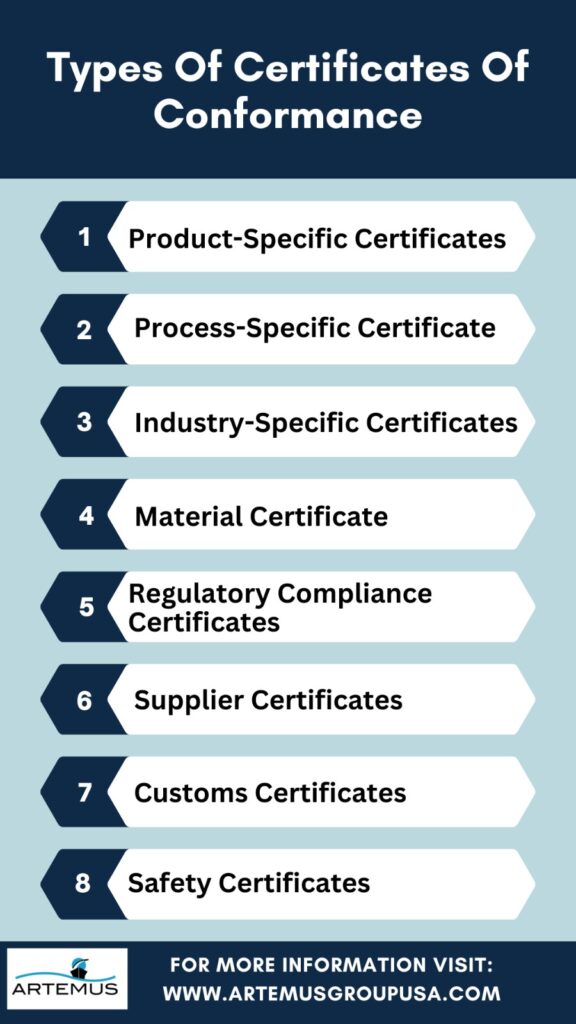
What Is Inbound Logistics & Outbound Logistics? A 2025 Guide
In the dynamic world of supply chain management, understanding the nuances of inbound and outbound logistics is crucial for operational

Certificate of Conformance (CoC) is a fundamental document that underscores the commitment to quality, compliance, and reliability across diverse industries. In an increasingly regulated and competitive marketplace, businesses strive to uphold stringent standards and regulations to maintain their reputation and meet customer expectations.
Through this series, we’ll explore the significance, benefits, and intricacies of the CoC, shedding light on its role in fostering trust, streamlining processes, and driving industry excellence.
At the forefront of compliance solutions, Artemus Transportation Solutions offers cutting-edge ISF & AMS compliance software solutions, empowering businesses to navigate complex regulatory landscapes with ease and confidence.
Table Of Contents
The Certificate of Conformity (CoC) is a crucial document in various industries, serving as a formal declaration that a product, process, or service meets the required standards, regulations, or specifications. Essentially, it acts as tangible evidence that the item or procedure in question has undergone thorough testing, inspection, and assessment to ensure compliance with relevant criteria. This certificate affirms the quality and safety of the product or service and signifies adherence to legal and industry-specific requirements.
Whether in manufacturing, trade, or service sectors, the CoC is vital in building trust among stakeholders, including consumers, regulators, and business partners. It serves as a testament to the commitment of the issuing entity toward maintaining high standards of quality and compliance, thus fostering confidence in the reliability and integrity of the certified entity’s offerings.
Related: What Is Global Trade Compliance & Its Key Components
In shipping, a COC certificate, also known as a Certificate of Conformity, is a document that confirms the compliance of shipped goods with the standards and regulations of the importing country. It serves as evidence that the products being shipped meet the necessary quality, safety, and environmental standards required by the destination country’s authorities.
This certificate is particularly essential for international trade, where different countries have varying regulatory requirements and standards. By obtaining a COC certificate, exporters ensure smooth customs clearance and avoid potential delays or rejections at the port of entry.
Additionally, it demonstrates the commitment of the exporter to delivering goods of high quality and conformity, enhancing trust and confidence among buyers and stakeholders in the global shipping industry.
Related: How Long Does Customs Clearance Take? Key Takeaways
The Certificate of Conformance (CoC) carries a myriad of benefits across industries, serving as a cornerstone for quality assurance, regulatory compliance, and customer trust. Here are the key advantages:
Related: Shipment Has Been Given A Release Status By Customs
A Certificate of Conformance (CoC) typically includes important details that verify a product’s compliance with specific standards, regulations, or contractual requirements. Common information found on a CoC may include:
Related: Customs Compliance Software: Key Benefits & Top Suggestions

Certificates of Conformance (CoC) come in various types, each serving a specific purpose within different industries and regulatory frameworks. Understanding these types is essential for businesses to ensure compliance and meet customer expectations. Here are some common types of Certificates of Conformance:
These certificates attest to the conformity of individual products with applicable standards, specifications, or regulations. They typically accompany each product shipment and provide details regarding its compliance, such as batch or serial numbers, testing results, and manufacturing dates.
Process-specific CoCs certify the conformity of manufacturing or service processes rather than individual products. They validate that the production or service delivery processes meet specified standards and regulations, ensuring consistent quality and compliance across all outputs.
Certain industries have specialized certification requirements tailored to their unique characteristics and regulatory frameworks. Examples include ISO certifications for quality management systems, GMP (Good Manufacturing Practices) certifications for pharmaceuticals, and AS9100 certifications for aerospace manufacturing.
Material certificates, also known as mill certificates or material test reports, confirm the properties and composition of raw materials used in manufacturing. They provide crucial information regarding material quality, traceability, and compliance with industry standards and specifications.
These certificates affirm compliance with specific regulations or legal requirements imposed by government authorities or regulatory bodies. Examples include certificates of compliance with environmental regulations, safety standards, or import/export regulations.
Supplier certificates validate the conformity of products or services supplied by external vendors or subcontractors. They ensure that goods or services meet the required standards and specifications before being incorporated into the final product or delivered to the customer.
In international trade, customs certificates, such as Certificates of Origin or Certificates of Free Sale, facilitate customs clearance and verify the origin or quality of goods being imported or exported. They help ensure smooth cross-border transactions and compliance with trade agreements.
Safety certificates confirm that products or processes meet safety standards and regulations to protect consumers, workers, and the environment from potential hazards. Examples include CE marking for European Union markets and UL certification for electrical products in the United States.
Related: How To Do Custom Clearance In USA For Goods? The Process
Obtaining a Certificate of Conformance (CoC) is a systematic process that involves thorough documentation, testing, and compliance with relevant standards and regulations. Here’s a step-by-step guide on how to obtain a CoC:
Determine the specific standards, regulations, or specifications that your product, process, or service needs to comply with. Research industry standards, governmental regulations, and customer requirements to ensure comprehensive compliance.
Assess your current operations, products, or services against the identified standards and regulations. Identify any gaps or areas of non-compliance that need to be addressed before pursuing certification.
Develop a detailed plan outlining the steps required to achieve compliance with the identified standards and regulations. This plan should include tasks such as updating processes, implementing quality control measures, and acquiring necessary documentation.
Establish a robust Quality Management System (QMS) that outlines procedures, processes, and controls to ensure consistent quality and compliance with standards. Document all relevant policies, procedures, and records required for certification.
Perform necessary testing and inspection of products or processes to verify compliance with standards and regulations. This may involve in-house testing, third-party testing, or certification by accredited laboratories or certification bodies.
Gather all required documentation, including test reports, inspection records, manufacturing records, and quality management documentation. Ensure that the documentation is accurate, up-to-date, and properly organized for submission.
Apply for certification to the relevant certification body or regulatory authority. Provide all necessary documentation and information required for review and evaluation.
Prepare for and undergo an audit or assessment conducted by the certification body or regulatory authority. During the audit, the certifying body will review your processes, documentation, and compliance with the applicable standards and regulations.
Address any non-conformities or deficiencies identified during the audit process. Implement corrective actions to rectify issues and ensure full compliance with certification requirements.
Upon successful completion of the audit and resolution of any non-conformities, you will be issued a Certificate of Conformance. This certificate serves as official recognition of your compliance with the specified standards and regulations.
Maintain ongoing compliance with the standards and regulations by continually monitoring and updating your processes, procedures, and documentation as necessary. Participate in regular audits and assessments to ensure ongoing certification.
Related:Custom Clearance Charges & Fees: A Complete Guide
The Certificate of Conformance (CoC) holds significant importance across diverse industries, serving as a cornerstone for quality assurance, regulatory compliance, and customer satisfaction. Here’s a brief overview of its importance in various sectors:
Related: What Is Customs Clearance? Meaning & Regulations
Certificate of Conformance (CoC) and Certificate of Analysis (CoA) are two distinct documents that serve different purposes within various industries. Here’s a comparison between the two:
Related: Customs Broker VS Freight Forwarder: 5 Key Differences
Certificate of Conformance (CoC) and Certificate of Compliance (CoCom) are both important documents used in various industries to ensure adherence to standards, regulations, and contractual requirements. Here’s a comparison between the two:
Related: OTI License Requirements, Costs, Renewal, & Regulations
A Conformance Certificate is a document issued by a manufacturer or supplier, confirming that a product or service meets specified standards, regulations, or contractual requirements, ensuring compliance with quality and performance criteria.
A Certificate of Conformance is typically provided by the manufacturer or supplier of a product or service, affirming that it meets specified standards, regulations, or contractual requirements.
A Conformity Certificate is a document confirming that a product, process, or service complies with specified standards, regulations, or contractual requirements, ensuring adherence to quality and performance criteria.

The Certificate of Conformance (CoC) serves as a vital assurance of quality, reliability, and compliance in various industries. By affirming that products, processes, or services meet specified standards, regulations, or contractual requirements, the CoC instills confidence among customers, stakeholders, and regulatory authorities. Its significance lies not only in validating adherence to established norms but also in fostering trust, facilitating market access, and mitigating risks associated with non-compliance.
As businesses continue to prioritize quality assurance and regulatory compliance, the CoC remains a cornerstone for demonstrating commitment to excellence and meeting the ever-evolving expectations of a global marketplace.
Related: Shipment Has Been Given A Release Status By Customs

In the dynamic world of supply chain management, understanding the nuances of inbound and outbound logistics is crucial for operational

In today’s interconnected world, businesses rely heavily on global trade to expand their markets, access new resources, and drive growth.

Importing goods for resale in the USA presents a lucrative business opportunity, but navigating the complexities of U.S. customs regulations,
Get In Touch
Artemus’ Software Solutions for ISF, AMS, Japan AFR, eManifest Canada, & Panama B2B filings.